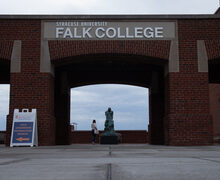Deputy Chief Richard Shoff spearheads Syracuse’s community policing efforts
Katie Reahl | Staff Photographer
Deputy Chief Richard Shoff has spent the last 29 years serving on the Syracuse Police Department.
Richard Shoff — who has been part of the Syracuse Police Department for nearly three decades, served six years in the United States Navy and has overseen every job in the city police’s community services bureau — was appointed deputy chief of community policing last month by Mayor Ben Walsh.
Walsh committed to improving policing in Syracuse and championed community policing during his mayoral campaign last year.
Community police officers work in small geographic areas and improve communication and responses between residents and the police department, Shoff said. As he moves forward, Shoff said he’s committed to improving recruitment of and relationships with underrepresented populations in the SPD.
“Community policing to me, it’s more of a broad concept, and it should be a philosophy for the whole entire department to try and engage the community you serve on every level that you can,” Shoff said.
Shoff, whose father and grandfather were police officers, has spent the last 29 years serving on the SPD. He headed the community policing division for the last eight years under former Syracuse Mayor Stephanie Miner.
Expanding outreach in Syracuse is Shoff’s long-term goal, but one activist said expanding community policing isn’t enough.
Herve Comeau, an organizer for Black Lives Matter Syracuse, said the SPD needs to do more to address police accountability, and change the culture of policing. Despite understaffing, Comeau added that SPD doesn’t accurately represent the community.
In 2015, only 12 percent of the department were women, and 10.5 percent were people of color, according to the SPD’s 2015 annual report. The city’s population, in comparison, is 52 percent women and about 44 percent people of color, according to Syracuse.com.
“The culture around this is the problem,” Comeau said. “It’s the lack of awareness and the lack of compassion and empathy.”
Shoff said one of his primary goals is to improve recruitment and engagement with underrepresented communities in Syracuse, including immigrants, black and Latinx people and women.
But Shoff also said the city needs to hire more officers to improve incident response times. SPD cost the city $13 million in overtime pay in 2016 due to understaffing, per Syracuse.com. Walsh said he would hire more police officers to combat understaffing at a candidate forum last October, and announced he would hire 25 to 30 more officers last month.

Anna Henderson | Digital Design Editor
Increasing the number of police officers in the city is not the right thing to do, though, Comeau said. Syracuse needs more social workers, more jobs and more educational and employment opportunity for the city’s youth, he said.
“I don’t think barbecues with the police or community policing are the answer,” Comeau said.
Shoff said he believes SPD has a great relationship with the community, and that there will always be some people who feel differently. But the relationship is always a work in progress, he added.
“The sooner you start (with kids), the better,” Shoff said. “… You make impressions on children when they’re young.”
Rich Puchalski, director of Syracuse United Neighbors — a grassroots organization committed to improving the lives of people living in neighborhoods on the south, southwest, and near-west sides of Syracuse — said Shoff always attends Safe and Healthy Neighborhoods meetings.
The community service bureau handles both community policing and recruitment, as well as Drug Abuse Resistance Education and gang resistance programs.
Shoff said his children still remembered their DARE officer from when they attended Franklin Elementary School.
Puchalski said the city needs more community policing, and some people feel there needs to be more police visibility through walking patrols. There must be more interaction between the community and police, he said.
“Chief Shoff’s compassion for the community and willingness to listen has earned him respect in every corner of the city,” Walsh said in a statement to The Daily Orange. “I am confident in his ability to lead the city’s efforts to implement a community policing model that connects residents with the police department.”
Shoff said he would continue to serve as deputy chief, if Walsh asked him to.
“We serve the community. The community knows what they need,” Shoff said. “And for us to get information from the community, they have to be comfortable with you, and you have to be comfortable with them.”
Published on February 19, 2018 at 11:32 pm
Contact Kennedy: [email protected] | @KennedyRose001




